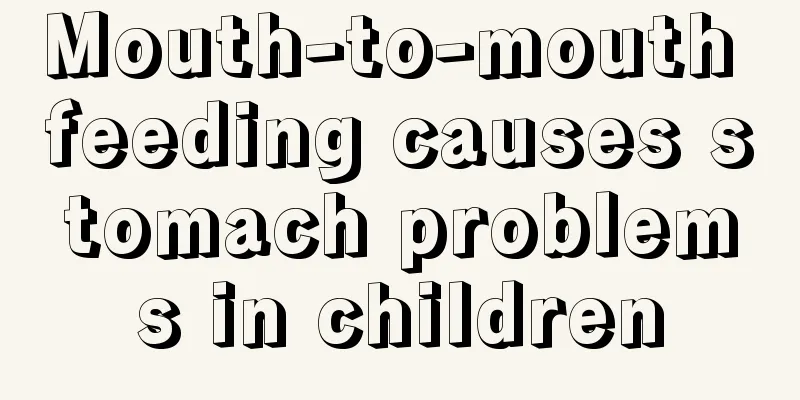Mouth-to-mouth feeding causes stomach problems in children

|
Haohao is just in the first grade of elementary school. In the past three or four months, he has been complaining of stomachache all the time, and sometimes he would dry heave and feel nauseous. At first, his mother didn’t take it seriously, thinking that he had an upset stomach. But one time, he actually vomited a little blood, which scared the whole family, and they quickly took him to the hospital for examination. After examination, the doctor told Haohao's parents that he was suffering from peptic ulcer. Mom and Dad were very surprised when they heard this: How could he have stomach problems at such a young age? Helicobacter pylori is the culprit of stomach disease in infants and young children Stomach problems are not unfamiliar to many people, but it is difficult to associate them with a child. "According to Xie Danyu, chief physician of the Department of Pediatrics at Guangdong Provincial Women and Children's Health Care Hospital, in fact, there are many children who come to the pediatric clinic for treatment due to chronic gastritis or duodenal ulcers. Since gastric disease can persist for a long time and recur repeatedly, it has a certain degree of impact on the physical and mental health of children. In severe cases, it will affect the growth and development of children and even endanger their lives. Therefore, children's gastric disease also needs to be given enough attention by parents. He told the Xin Kuai Bao reporter that there are many causes for the occurrence and development of gastritis, duodenitis, peptic ulcer and other diseases in children, among which Helicobacter pylori (Hp) infection is receiving more and more attention. Helicobacter pylori is one of the most common pathogens living in the human gastric mucosa, and humans are the only natural host of this pathogen. my country is a country with a high rate of Helicobacter pylori infection, and children are not immune. They are also a high-risk group for Hp infection. This may be related to the fact that children's gastric function is not yet fully developed, and their control of gastric acid secretion and immune function are relatively low. Most Helicobacter pylori carriers become infected with Hp during infancy, and the infection rate increases significantly with age. However, most people do not develop the disease until adulthood, some develop the disease in childhood, and some may never develop the disease throughout their lives. Helping children chew food or licking it to test the temperature can lead to infection Helicobacter pylori is widely present in nature and can be transmitted through word of mouth or fecal-oral transmission. Children have less external activities, and parents or close family members are the main source of Hp infection in infants and young children. If parents are infected with Helicobacter pylori, their children will have a relatively increased chance of infection. "Especially when feeding and in daily life, some parents like to feed their children mouth-to-mouth or bite off the food before feeding, use their tongue to test the temperature of the food before feeding, suck one or two sips of the nipple before feeding to test whether the temperature is appropriate, eat a meal with the child, kiss the child's mouth, etc. These inadvertent actions may transmit Hp in your body to the child." Xie Danyu said. In addition, children who like to eat snacks, have irregular and improper diet for a long time, have excessive mental stress, take drugs that are irritating to the gastric mucosa for a long time, etc., will also reduce the protective function of the gastrointestinal mucosa due to gastrointestinal nerve regulation disorders, and may also create conditions for the invasion of Hp. After Hp infection, it is generally difficult to be cleared by the body and slowly becomes a chronic infection, causing diseases such as chronic gastritis and peptic ulcer, resulting in symptoms such as anorexia, abdominal pain, abdominal distension, nausea, vomiting, acid reflux, and belching. Among them, abdominal pain is more common in the form of persistent dull pain or paroxysmal spasmodic. In addition, some children may also experience symptoms such as weight loss and even gastrointestinal bleeding. Therefore, it is important to detect Helicobacter pylori infection early and treat it in time. Experts advise If your baby has repeated upper abdominal pain and is thin, you should seek medical attention as soon as possible to check for Hp Since abdominal pain is a common symptom in children, the causes are many and complex. In addition, children's verbal expression of various clinical symptoms of the disease is not accurate enough, which can easily lead to misdiagnosis and missed diagnosis. So, how can parents detect early that their children are also infected with Helicobacter pylori? Xie Danyu said that if parents already know that they have Helicobacter pylori gastritis, and their children have repeated upper abdominal or periumbilical pain, especially at least three discontinuous abdominal pains in three months or more, and the children are relatively thin, after excluding digestive tract symptoms caused by upper respiratory tract infection, liver and gallbladder disease, intestinal obstruction, myocarditis, improper diet, etc., they should go to the hospital for a gastroscopy as soon as possible. If the child cannot undergo a gastroscopy, they should undergo a breath or stool Hp urease antibody rapid test as soon as possible to see if the abdominal pain is caused by gastritis, gastrointestinal ulcers, etc. caused by Helicobacter pylori infection, so as to achieve early diagnosis and early treatment. Once it is confirmed that the child has Helicobacter pylori infection, medication should be taken under the guidance of a doctor. The current treatment methods are mainly to reduce gastric acid secretion and acidity, protect the gastric mucosa, and improve the blood supply to the gastrointestinal mucosa to relieve pain. To achieve the goal of radical cure, the key is to completely eliminate Hp from the child. |
<<: Six major psychological defects of primary school students that parents should know
>>: The mother's many foolish actions hurt the baby
Recommend
What causes children’s tooth mobility?
Mothers are always concerned about their children...
What should I do if my child has a fever and refuses to eat?
Most children will suffer from some illnesses dur...
Symptoms of fever and cramps in children
As we all know, people who eat grains will inevit...
What should I do if my 2-year-old baby vomits and has diarrhea?
Babies are a group that is very prone to illness....
How can a short child grow taller?
There are many short people around us in our live...
What to do if your baby has a fever and convulsions
It is very common for babies to have fever, but w...
What to do if baby has ringworm on head
In life, we may have to fight against some diseas...
What to do if a child has a fever in autumn
Everyone knows that the temperature in autumn is ...
What to do if your child grows too fast
Children nowadays generally suffer from precociou...
Does hernia hurt when a child has it?
Some parents will suddenly find that their child&...
What causes a lump in the baby's chest?
For many parents, shortly after their baby is bor...
What foods can children eat to grow taller
Whether a child grows taller or not has a lot to ...
What should I do if I have precocious puberty?
Precocious puberty is a phenomenon that has emerg...
Why does a newborn baby always make noises while sleeping?
During the growth period of newborns after birth,...
What to do if children have abdominal distension and pain
It is common for children to have abdominal diste...









